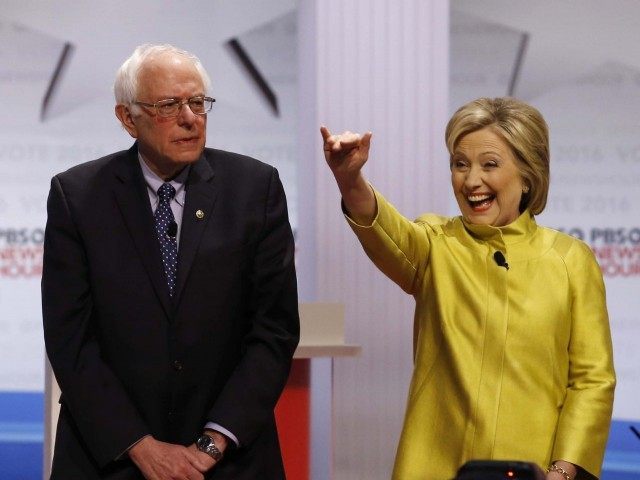On Saturday, socialist Sen. Bernie Sanders posted a landslide victory against Hillary Clinton in the Washington State Democrat caucus. With turnout approaching 2008 record levels, Sanders won with 73 percent of the vote.
Unfortunately for Sanders, though, Hillary Clinton had already locked up most of the state’s 17 superdelegates. She already has pledges of support from 10 of Washington’s superdelegates. While Sanders gets 73 percent of support from voters, Hillary Clinton gets 60 percent support from the superdelegates.
The role of superdelegates is unique to the Democrat party. Making up around 15 percent of the total number of delegates, superdelegates are individuals who are given their own vote for the Democrat nominee by virtue of their elected position. They include Democrat Governors, members of Congress, members of the DNC, and certain elder or “distinguished” party leaders.
A superdelegate’s vote for the Democrat nomination is bound only by their own conscience. They are not bound by the primary or caucus results in their home state or congressional district. Their votes are not cast until the Democrat convention in Philadelphia, when their votes are added in to the totals in their home state.
Despite this, however, delegate trackering sites sponsored by media outlets include the pledges of superdelegates in the overall totals of delegates won in the primary contests. This is disengenous, as the votes of superdelegates can change up until the moment they cast their vote.
While the overall delegate count may be misleading, it potentially has an impact on the Democrat race. Currently, Politico lists Hillary Clinton has having the support of 1,712 delegates, while Bernie Sanders has 1,004. These numbers will change slightly in Sanders’ favor as the delegates from Saturday’s contests are awarded. Even now it shows a 700 delegate margin between the two candidates.
If we only consider the delegates awarded at primary and caucus votes so far, however, the race is much tighter. Setting the superdelegates aside, Hillary has just 1,266 delegates against Bernie Sanders’ 1,038 delegates. (These figures reflect more up-to-date delegate totals from Saturday’s vote than Politico currently has.)
In other words, if we only consider the delegates awarded through actual Democrat voters, the margin between Clinton and Sanders is just about 200 delegates. The margin between the two, in fact, is just about 10 percent of the nearly 2,000 delegates still to be awarded.
In her 2008 primary, Hillary Clinton also boasted an enormous lead over Barack Obama among superdelegates. The media didn’t include these superdelegates at the time, for the simple reason that their votes weren’t in any way bound until the convention. Indeed, as Obama continued to win primaries, the superdelegates began defecting to his campaign from their earlier pledges to support Hillary.
She led among superdelegates decisively in 2008 until she didn’t. As the Democrat convention neared, a wave of superdelegates switched first to neutral and finally to Obama. It is not inconceivable that a similar dynamic happens this year.
Hillary Clinton’s firewall this campaign has been her dominance in the Southern states. She has won with states by large margins, due mostly to her nearly universal support among African-American voters. These southern states have all voted now, though.
The states still to vote in the Democrat nominating contest include the upper Plains, Mid-Atlantic, and New England states. These are all areas where Bernie Sanders has been very competitive. Although he won’t pass Hillary Clinton on delegates because of proportional allocations, he will likely keep the margin tight.
In the end, Hillary Clinton may only be able to claim the Democrat nomination on the votes of superdelegates. She is likely to fall short of an outright majority on the delegates awarded by rank-and-file delegates. She may need the superdelegates to pull her across the finish line to the nomination.
Will the superdelegates, voting as a block, be willing to do that? In our example of Washington state, the superdelegates are completely on the opposite side of their own voters. Three out of four Democrats in the state voted for Bernie Sanders. Ten of the 17 superdelegates in the state, however, are backing Hillary Clinton. Will these 10 elected officials counter the wishes of nearly 200,000 Democrat voters in the state?
Republican voters nationwide are currently worried that the party’s establishment will try to put its thumb on the scale to influence theGOP nomination. Democrats, however, ought to worry that their party’s establishment IS the scale.

COMMENTS
Please let us know if you're having issues with commenting.